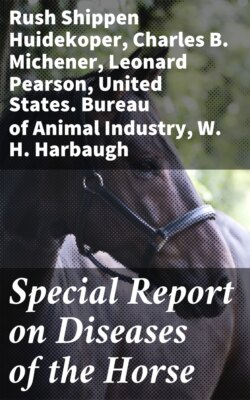Читать книгу Special Report on Diseases of the Horse - Charles B. Michener - Страница 9
На сайте Литреса книга снята с продажи.
HISTORY.
ОглавлениеIt is important to know, first of all, something of the origin and development of the disease; therefore the cause should be looked for. The cause of a disease is important, not only in connection with diagnosis, but also in connection with treatment. The character of feed that the horse has had, the use to which he has been put, and the kind of care he has received should all be closely inquired into. It may be found by this investigation that the horse has been fed on damaged feed, such as brewers' grains or moldy silage, and this may be sufficient to explain the profound depression and weakness that are characteristic of forage poisoning. If it is learned that the horse has been kept in the stable without exercise for several days and upon full rations, and that he became suddenly lame in his back and hind legs, and finally fell to the ground from what appeared to be partial paralysis, this knowledge, taken in connection with a few evident symptoms, will be enough to establish a diagnosis of azoturia (excess of nitrogen in the urine). If it is learned that the horse has been recently shipped in the cars or has been through a dealer's stable, we have knowledge of significance in connection with the causation of a possible febrile disease, which is, under these conditions, likely to prove to be influenza, or edematous pneumonia.
It is also important to know whether the particular horse under examination is the only one in the stable, or on the premises, that is similarly afflicted. If it is found that several horses are afflicted much in the same way, we have evidence of a common cause of disease which may prove to be of an infectious nature.
Another item of importance in connection with the history of the case relates to the treatment that the horse may have had before he is examined. It sometimes happens that medicine given in excessive quantities produces symptoms resembling those of disease, so it is important that the examiner be fully informed as to the medication that has been employed.
